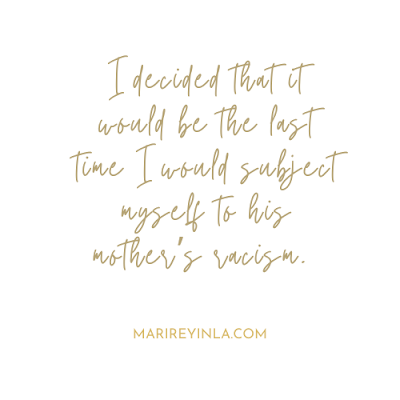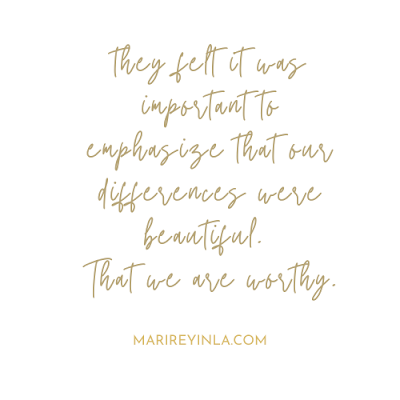For the Love of Brown
“I don’t want to
look like another race.”
This statement has stayed on my mind over the past few days. It irks me to my core and signifies (at least to me) that there is an issue with having darker skin. That is a problem.
As a first-generation
Mexican American woman, with a fabulous brown complexion, I get fired up when
people make comments on the “darkness” of one’s skin color. It is unnecessary and inappropriate. It is a “tool”
used to make others self-conscious or feel inferior to lighter skinned people.
It is disgusting.
Growing up, I
was the darkest in my friend group. Neither my skin color nor race was ever an
issue. I have a memory of my childhood friend asking me why my skin was
different than hers. I told her, “It’s just the way God made me.” She nodded in agreement and never mentioned
it again. I went to a predominantly white school and, fortunately, did not feel
out of place.
I started
feeling a shift when I went to high school. I went from a graduating class of fourteen
to a school with hundreds of students. The size of the student body was
shocking, but I did not have issues regarding my ethnicity. I was excited that
there was a more diverse student body and potential friends that I could connect
with. I was wrong. To my disbelief and
surprise, I felt the most microaggressions at the hands of Latino students. I
kept it moving.
It would be
years later that I would reflect on my upbringing and notice the microaggressions
that were aimed at myself or other non-white students. Statements that I
brushed off or responded to with, “You’re an idiot.” Regardless of my response,
I would shut it down. It was always a stupid boy trying to cut me down
when I would ignore their advances or show no interest in them. It was juvenile,
sick, and there are moments I look back and wish I would have said something different.
Wish I would have realized what was happening in the moment and called them out
for their blatant racism.
It was the
naivete of my fifteen-year-old self that rejected the idea of someone being
racist towards her. The denial that it could happen to me or recognize that it was
racism. Honestly, at the time I thought these boys were just that: boys. I
thought they were not clever enough or mature enough to accept rejection and
move on. Telling me that they changed
their mind and did not want to date someone with a “green card” sounded idiotic
to me.
When I was twenty-seven,
I started dating my now ex-husband. When I first met his parents, things were
good. There was acceptance and kindness all around. It was only after we got
engaged a few years later that the masks came off and I experienced racism at
the hands of his parents. It was jarring and caused rifts between my partner
and I, and at times between his parents and us.
I recall
becoming enraged when my ex would dismiss his mother’s racism as being “out of
touch.” He even repeated the sentiment to our therapist. I remember that
session because we spent thirty-minutes explaining what racism was and how her
actions were racist. It took him thirty minutes to concede and admit he was
turning a blind eye to it because he did not know how to handle it. He thought
it would be easier to side with the “majority,” than to speak up for the
minority. It still blows my mind.
The deterioration of our relationship was evident in our daily lives. We drifted apart and became enemies faster than it took us to fall in love with one another. On top of the deception, ignorance, and what I was seeing at the time as bigotry from my partner, the constant reminder that I was different than him and his family was too much.
My last trip to
visit is parents would be Memorial Day weekend 2017. It was the last time I saw them and the beginning
of freedom for myself. It was on that trip that the final blow came. I decided that
it would be the last time I would subject myself to his mother’s racism. It had
been years of her micro aggressive commentary. Years of, “Why do Mexicans name
their kids Jesus?” Years of, “Oh good,
they have a section on the menu with your kind of food.” I had had
enough.
The topic of my
skin color had been discussed on a previous occasion, and not in a good way. I
remember not responding to it. I was waiting for my partner to intervene and
say something. To be the hero in the moment and point out their wrongdoing. I
was left to drown.
This trip had
overall been pleasant. As pleasant as it can be when you are constantly
reminded that you are different. On the last day of the trip, I wanted to enjoy
the sun a little while longer and work on my tan. This became a problem. I had
never seen a group of people band together in opposition to tanning. I ignored
their opposition and went on my merry way to sit outside. A few minutes later
someone brought me a sweater to wear, in the heat, because “I was dark enough”
and they did not want me to get darker. What in the actual fuck?
I refused to wear
the sweater and engaged in a back and forth about how it was wrong to make such
a request. I remember saying something to the effect that their request was out
of line and racist. I was met with resistance and gaslighting. It was my fault I
felt that way. They were doing nothing wrong. I looked at my ex for
support and found a blank stare.
Stunned, I composed
myself and decided to move inside. I started to count down the minutes before
we would leave, and I would let my ex have it. The comments continued about the
darkness of my skin. I was told that I had “negro” skin – yes, negro skin – and
that was the reason why I was dark. That I should not aim to be darker, but work
on blending in with their family. THAT WAS THE MOST LUDRICOUS THING I HAD HEARD
ON THAT TRIP. LUDRICOUS.
In that moment,
I knew this was not my “family” nor did I want to be part of a family that
worked hard at diminishing others. I did not want the rest of my life to be filled
with anger or racism. I was no longer going to be subjected to hatred. I wanted
out, especially after my ex’s failure to speak up and say something. I don’t
know what I was expecting. He did not speak up for me when we were fiancés, how
could I expect him to speak up for me now as his wife. The ending was on the
horizon.
Fast forward to
present day, I was having a conversation with…an acquaintance [?] about a dress
I plan to wear to an upcoming event. The dress is this hot pink number that I
think will look good with a fresh tan. I really want it to look good. It is a
summer wedding, and this is the time to wear something fabulous, right? [Don’t worry, I cleared it with the grooms,
and they are fine with bright colors at their wedding!]
In that
conversation she disapproved of tanning. She continued stating that culturally
being darker is a negative thing (keep in mind, she herself is dark skinned). I
was astounded by this, not because I had never heard of it, but that she agreed
that being dark is a bad thing. I will admit that I do not understand the cultural
aspect of it. I am not even going to attempt to explain it away or dismiss her
feelings. The issue I am having is the comment of not wanting to look like
another race. That is where it gets murky.
Her cultural
belief that being dark skinned is bad is rooted in racism.
As I stated before,
I am not going to try to explain her culture. I do not know what it is like growing
up being brainwashed into believing that dark skin is bad. I cannot pretend to
understand that kind of oppression and I do not want to shame her. You cannot
convince someone that their beliefs are wrong. Her beliefs are different than
mine and I cannot and will not force her into loving her dark skin or debate
her on how wrong I believe her stance is. I will not turn a blind eye to
it either.
Rather than
attack or shame her, which seems to be what a lot of people consider “jumping
into action,” I decided to take the route of least resistance. I shared my favorite
summer memories were those of laying out by a pool and tanning with my girlfriends.
How I recently spent time up in Northern California and embraced the heat and enjoyed
the day with my friend out by her pool. I chose to express myself through self-love
and appreciation for my dark skin.
“I don’t want to look like another race,” will echo in my mind for a long while. It isn’t something one forgets. The statement is rooted in self-hate and prejudice. It is sharing the idea that to be dark skinned is to not be enough. That being dark skinned is ugly. I hate it.
The statement awakened
something in me. It is the reason why I am writing this post. The thought of
someone hating themselves for their skin color is baffling. It is
heartbreaking. However, I am not that naïve fourteen-year-old girl. I
understand that all people of color have had to endure hatred for their
beautiful brown skin, for their sheer existence. Our skin color has been
weaponized and used as a method to make us feel inferior and sell an agenda
that we are not good enough.
I have had the good fortune of having parents that taught their children to embrace their differences. They sent us to a predominantly white school, so they felt it was important to emphasize that our differences were beautiful. That we are worthy. They taught their children to love themselves not only for what is on the outside, but the inside too. My parents built the foundation for our self-love and appreciation. This is not to say they did not mess us up, they did. My parents are far from perfect, but the good that they instilled in us has allowed us to be brave in this world.
We need to do a
better job to break the stigma. We need to do better to love ourselves and
others. It is not about embracing our differences, it is about sharing our love
for our differences, including our skin color.
Photo
Credit: All pictures are Mari Rey originals.






Comments
Natasha, I appreciate your comment. ❤❤